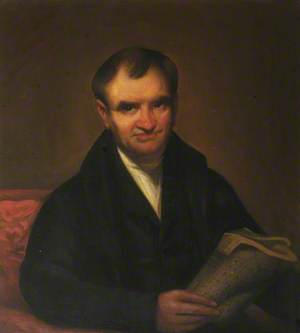Joshua Marshman (1768-1837)
Artist unknown

Joshua Marshman was a prominent missionary for the Baptist Missionary Society (BMS), and a part of the Serampore Trio. He was born to a Wiltshire-based weaver, John Marshman, and his wife, Mary Couzener. His family were poor and he received a scant education, but he read voraciously and is said to have read more than five hundred volumes before he turned eighteen. In 1791, Marshman married the daughter of a landowner, Hannah Shepherd, who greatly encouraged his academic and spiritual pursuits. After marriage, the couple moved to Bristol where Marshman taught at the school run by the local Baptist church. At the same time, he learnt Greek, Hebrew, Latin, Syriac and Arabic. In Bristol, he learnt about William Carey’s mission work in India, and made hasty preparations to join him. He sailed for India with his wife and two other missionary families, arriving and choosing to settle at the Danish colony of Serampore on 13th October 1799.
At Serampore, Marshman and his wife founded two boarding schools for European children, taking the main responsibility for the educational work of the mission. They also spearheaded the founding of schools for local children, with Marshman especially keen to encourage teaching in local languages. His rigour helped raise funds for the establishment of over a hundred schools, for which he helped compile textbooks. In 1818, he wrote a prospectus to propose the development of Serampore College, which received a charter from King Frederik VI of Denmark in 1827, and continues to this day. While contributing to educational developments, Marshman learnt Bengali and Sanskrit which allowed him and his colleagues to translate the Bible into many Indian languages, as well as to translate important works of Indian literature into English. In 1806 he started learning Chinese, allowing him to translate the Bible into yet another language. In addition to languages, Marshman excelled in apologetics and the defence of the Christian faith. Known to have engaged in long conversations with Hindus and unbelieving Europeans in British India, Marshman famously debated with the socio-religious Hindu reformer Raja Ram Mohan Roy, vigorously asserting the divinity and atonement of Christ. About Marshman’s quality, Carey once wrote, ‘In a point of zeal he is a Luther and I am Erasmus.’ Like Carey, Marshman suffered from occasional melancholia. He died in Serampore on 5th December 1837.